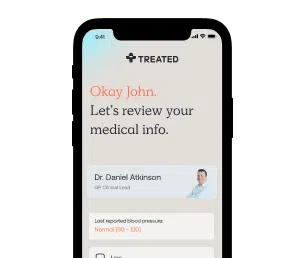Jet lag
Get the most out of every trip.
Secure delivery
UK clinicians
Jet lag is when your usual sleeping pattern is disrupted following a long flight.
It doesn’t have to spoil your travels though, and it normally improves after a couple of days once your body has got used to the new time zone. Order jet lag treatment online and get the most out of your next trip.
Your body clock works according to the hours of daylight and the rising and setting of the sun to keep you in-sync with the environment you live in.
When you travel to a different time zone this can be disrupted, causing your body to struggle to adapt. It can be common for you to feel like you need to sleep in the middle of the day, or to feel wide awake at bedtime. You might also feel irritated, or like you’re struggling to concentrate.
Jet lag can also affect your digestive system if your meal times become out of sync with what your body is used to, causing indigestion, nausea and constipation.
Anyone who travels through different time zones can experience jet lag. The more significant the time zone change, the more disruptive jet lag tends to be. When travelling from Europe to America, for example, the time difference can be between five and seven hours, meaning that it can often be daytime in America when it’s night time in Europe. This can cause your sleep schedule to become disrupted as you get tired earlier than normal.
Jet lag is usually worse when travelling east, because you ‘lose’ time and have to stay awake for longer, which can make it more difficult to adjust .
You might also suffer more from jet lag as you age, because you produce less of the sleep hormone ‘melatonin’ as you get older.
Jet lag is very common among people who travel by plane, particularly those who travel east over long distances.

How we source info.
When we present you with stats, data, opinion or a consensus, we’ll tell you where this came from. And we’ll only present data as clinically reliable if it’s come from a reputable source, such as a state or government-funded health body, a peer-reviewed medical journal, or a recognised analytics or data body. Read more in our editorial policy.
Jet lag is caused when your body’s natural circadian rhythm falls out of sync with your environment. Your circadian rhythm is an internal clock that regulates your hormones to make you feel sleepy or alert at certain times. So when you change time zones, these hormones can become out of sync with the time, making you feel tired during the day and awake at night.
This can cause a range of symptoms, the strength of which often depend on the number of time zones you’ve travelled through, as well as the direction of travel.
The main symptoms of jet lag include:
In some cases jet lag can also cause disruption to your digestive system, which can cause indigestion, stomach cramps and constipation.
Some people also report feelings of mild anxiety when they are jet lagged.
Although jet lag itself isn’t dangerous, the sleep deprivation associated with it can have an impact on your overall health - leading to disordered sleep and insomnia.
There’s also some evidence to suggest that it can increase your risk of cancer, infertility, and heart disease.

How we source info.
When we present you with stats, data, opinion or a consensus, we’ll tell you where this came from. And we’ll only present data as clinically reliable if it’s come from a reputable source, such as a state or government-funded health body, a peer-reviewed medical journal, or a recognised analytics or data body. Read more in our editorial policy.
Melatonin is the only approved treatment for jet lag in the UK.
Melatonin is a naturally occurring ‘sleep hormone’, which is produced in line with your circadian rhythm. When you’re jet lagged your body is out of sync with the time of day, so it doesn’t produce all the melatonin you need to help you to get to sleep.
As a result, taking melatonin in order to replace this deficit might be able to get your circadian schedule back on track.
As well as melatonin, there are a number of self-care methods that you can use to help you with the symptoms of jet lag.
Do:
Don’t:
You should also be careful to avoid melatonin supplements that don’t come from approved sellers - they might not contain the ingredients or dosages that they claim to.
Jet lag will usually improve on its own as long as you’re mindful of it and give yourself time to adjust to your new environment. Having a good bedtime routine is an important factor in limiting the effects of jet lag and helping a speedy recovery.

How we source info.
When we present you with stats, data, opinion or a consensus, we’ll tell you where this came from. And we’ll only present data as clinically reliable if it’s come from a reputable source, such as a state or government-funded health body, a peer-reviewed medical journal, or a recognised analytics or data body. Read more in our editorial policy.
Have something specific you want to know? Search our info below, or ask our experts a question if you can’t find what you’re looking for.

Registered with GMC (No. 4624794)
Meet Daniel
Registered with GPhC (No. 2202465)
Meet Sanjeda
Registered with GPhC (No. 2070724)
Meet Craig
Always read the leaflet that comes with your medication and tell us about any side effects you get.
We know health, but you know you.
Our experts tell you what’s safe, but you decide what’s best.
Answer a few questions and tell us about yourself. Get tailored advice from our clinicians so you can choose better.

Choose your treatment and how often you have it delivered.

We know things change. It’s the nature of life. We’ll check in regularly to make sure your treatment is still right for you.
Pause. Change. Skip. Start again. Any time you like.
Here are some other things we can help with.
Choose from our range of tablets and solutions. Get ongoing care and support from our experts.
Stop smoking treatments that can help you kick the habit forever, and reduce your risk of disease.
Tablets or injections. Tailored weight loss treatments combined with ongoing support from our experts.
We're making healthcare more about you. Sign up to our newsletter for personalised health articles that make a difference.
Disclaimer: The information provided on this page is not a substitute for professional medical advice, diagnosis, or treatment. If you have any questions or concerns about your health, please talk to a doctor.
Jet lag: current and potential therapies. P & T : a peer-reviewed journal for formulary management, 36(4), pp.221–31.
We couldn't find what you're looking for.
Here's everything we treat. Or, if you're looking for something we don't have yet, you can suggest something.
If there’s a particular treatment or condition you’re looking for, tell us and we’ll look into it for you.
Submit your question here, or tell us if you’ve found an issue on our site.
We’ll get back to you very soon. We aim to respond to all queries in one working day.
You’re signed up to our newsletter. Keep an eye on your inbox for our latest update.
By clicking 'Subscribe now' you're agreeing to our Privacy Policy.
We’ve sent you an email asking you to confirm your email address.